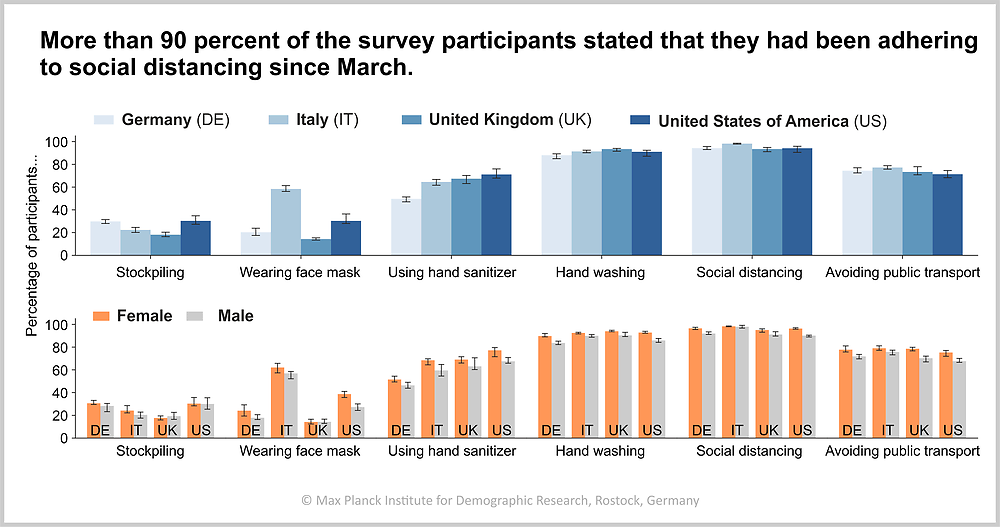June 04, 2020 | Press Release
Health Behavior during the Covid-19 Pandemic: Online Survey Provides Rapid Insights

© iStockphoto.com/GabrielPevide
Compared to other European countries and the USA, Germans adopted social distancing even before it was encouraged by the authorities. In all eight countries surveyed, women adopted preventive behaviors more than men.
"We found that women in the eight countries studied perceive Covid-19 as a much greater threat than men in their respective countries," explains research scientist Daniela Perrotta of the Max Planck Institute for Demographic Research in Rostock. She also notes, “They are also more willing to adopt preventive behaviors to protect themselves from Covid-19. This is interesting, since it has already been established that men are more likely to die from Covid-19 than women.” At the same time, women in most countries show less confidence in the health system to respond adequately to the pandemic.
The data was collected via Facebook by the research team of Daniela Perrotta and André Grow at the Max Planck Institute for Demographic Research. Since March they have been recruiting participants for an online survey via the social network. At the time of this evaluation, more than 65,000 people in seven European countries, including Germany, Italy, Spain and France, as well as in the USA, had taken part.
“Facebook enabled us to quickly collect a large sample of respondents. This allows us to explore patterns and trends in people’s responses to the pandemic across countries, if appropriate statistical corrections are applied” says André Grow.
Since Facebook only partially encompasses a cross-section of society, the survey is not representative. To deal with this issue the researchers adjusted the survey data for the main demographic characteristics, namely age, gender, and region of residence. In this way, the estimates obtained from the survey are approximately representative of the country’s population, thus making the data easily comparable between countries.
The researchers designed the questionnaire to collect timely information on different aspects of the pandemic, including questions about the health status of participants, their perception of threat, their trust in the authorities to deal with the pandemic, their social contacts, and their propensity to adopt behaviors to protect themselves from the disease. The researchers are now presenting their initial results in a study, which is available online as preliminary version in preprint.

An online survey on health behavior during the Covid-19 pandemic has been running in eight countries since March, 13. One result: In the survey period from mid-March to mid-April, in particular the Italians wore face masks. © MPIDR
Download figure (PNG File, 479 kB)
In the survey period, the adoption of preventive behaviors varies across countries. For example, on average, the use of a protective face mask is reported by only 6 percent of the participants in the Netherlands, but almost 60 percent of respondents in Italy. In all countries, however, over 85 percent of the participants reported having washed their hands more often. Overall, behaviors related to social distancing are the most commonly reported by respondents, ranging from 93 percent in the United Kingdom to 98 percent in Italy.
Compared to other countries, the adoption of preventive and social distancing measures in Germany was high from the very beginning, even before social distancing was encouraged by the authorities. At the same time, trust in the authorities and in the health system was high in Germany and has risen even further in recent weeks, while the perceived threat of the disease has decreased. Overall, Italians felt most threatened by Covid-19, followed by the British and Spanish.
Preliminary publication (preprint without peer review):
Perrotta, D., Grow, A., Rampazzo, F., Cimentada, J., Del Fava, E., Gil-Clavel, S., Zagheni, E.: Behaviors and attitudes in response to the COVID-19 pandemic: Insights from a cross-national Facebook survey DOI: doi.org/10.1101/2020.05.09.20096388